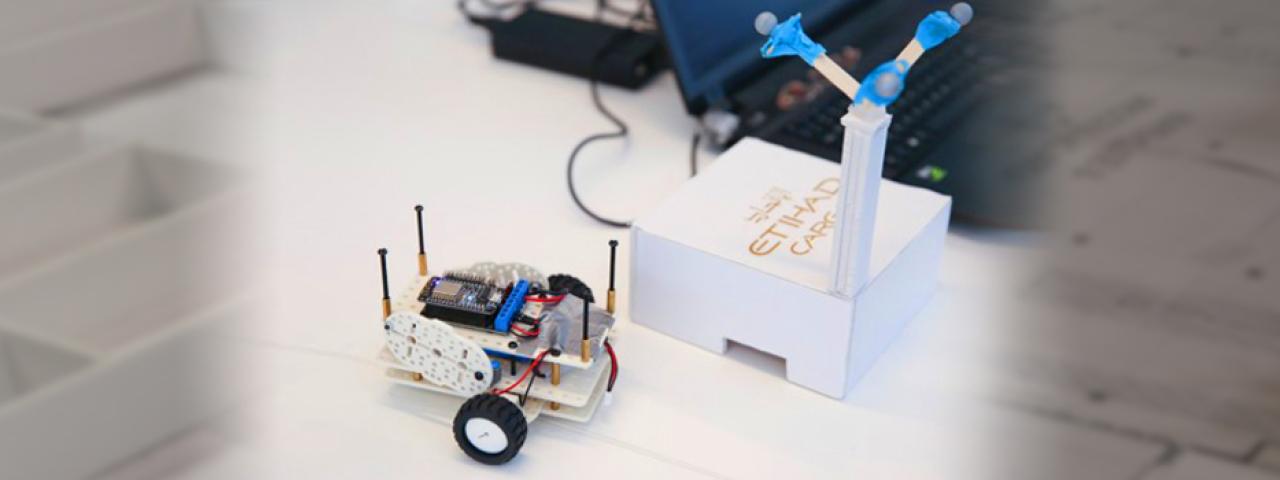There’s a flurry of activity behind the large glass doors of the Madrid meeting room in Etihad Cargo’s head office in Abu Dhabi’s Masdar City. The bright afternoon light streams in through large picture windows as students from New York University’s degree-granting campuses — eight from NYU Abu Dhabi, three from NYU Shanghai, and one from NYU New York— prepare to present interactive applications and product prototypes to senior Etihad Cargo officials.
A mechanical whir occasionally punctures the chatter in the room as a small, box-shaped robot with Etihad Cargo emblazoned across the top in gold letters moves across white tables in the center of the room.

Etihad's David Kerr, senior vice president of cargo, and Robert Fordree, head of cargo handling, are ready to see the student's protoypes for the first time:
- Cargie: a load-carrying robot capable of machine learning;
- Paper Trail: an app to track airway bills and cargo documents (the industry still relies heavily on paper);
- Viz360: a virtual training app; and
- HoloCargo, a 3D-scanning and virtual reality system that can help loadmasters build pallets of boxes in a 3D environment.
The prototypes are the end result of an intensive four-week summer course taught in Abu Dhabi by Christian Grewell, partner in the Program on Creativity + Innovation and professor of Interactive Media Arts at NYU Shanghai.
Students enrolled in the Driving Genius course are taught the ins and outs of robotics, programming, and design principles, combined with the technical know-how needed to develop products that cater specifically to the airline cargo industry, which is where Etihad Cargo stepped in as a course partner. The students get to use augmented reality, virtual reality, and sensory technology and also learn how be entrepreneurs, drawing up successful business plans for their products.

“It’s about establishing a partnership where students gain everything they would from a traditional course including the opportunity to test their models in the real-world ‘laboratory’ of the organization,” Grewell said about partnering with Etihad Cargo. “When Etihad engaged with us, they engaged across every function of their business and at various levels in the organization. We came up with ideas for people not just in executive positions, but in-line level operational roles. That's an invaluable experience for students when combined with the work we do in the lab and classroom.”
Students were given access to Etihad Cargo’s warehouse operations so they could understand how things work and identify processes where efficiencies could potentially be improved. They were then split into three groups and tasked with designing and developing feasible tailor-made solutions using virtual technology.
With augmented reality and virtual reality technology becoming more affordable and accessible, students in the course are also taught to manage expectations — their own and the client’s — to figure out what works best for a company’s business model.
Back in the Etihad Cargo meeting room, Grewell observes as the groups demonstrate their prototypes, occasionally chiming in with words of encouragement or offering bits of trivia.
“They’ve worked really hard on these presentations and the quality of their work is outstanding,” he said. “Generally students have all these great ideas and prototypes but they struggle when it comes to presenting.”
There’s no visible hint of a struggle or even nervousness as the students confidently field questions from Kerr and Fordree about their work prompting the senior vice president, at one point, to remark that their insights were spot on and that “the (cargo) industry is pretty underinvested in technology. I like to think that in the future, we’re not an airline business but a technology company with airplanes and warehouses et cetera.”
A final round of applause brings the presentations to a close and the students heave a sigh of relief as everyone shuffles out of the meeting room. It’s been an intense few weeks but Grewell emphasizes the need for a course like this as a bridge between classroom learning and meeting real-world corporate expectations.
“I think this is a win-win for all parties when educators, students and organizations come together,” he concluded.

Article by Deepthi Unnikrishnan, NYU Abu Dhabi Public Affairs
Photography by: Kasper Krasowiak and Deepthi Unnikrishnan





